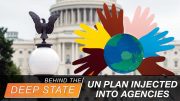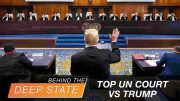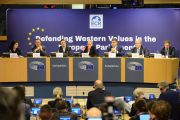
An American has been convicted by North Korea of trying to topple the government and sentenced to 15 years of hard labor. Kenneth Bae, 44, a resident of Washington state, was in North Korea on a tourist visa last year when he was arrested by North Korean authorities November 3 in the city of Rason near the border of Russia and China. CBN News reported that Bae, who is a committed Christian, was convicted by North Korea’s supreme court of attempting to topple the government and of other unspecified “hostile acts” against the communist nation.
South Korean sources familiar with the case said Bae may have been arrested for photographing starving children. Bae was born in South Korea but is a naturalized U.S. citizen who attended the University of Oregon. His most recent residence was the Seattle suburb of Lynnwood.
Reuters News quoted a North Korean defector as speculating that Bae will most likely serve his sentence in a special facility for foreign prisoners, rather than one of the nation’s notorious forced-labor camps for North Korean citizens. Some human rights groups estimate that more than 200,000 people are kept in such camps, where they are beaten and starved, and where many perish.
“If an American served jail together with North Korean inmates, which won’t happen, he could tell them about capitalism or economic developments,” explained Kwon Hyo-jin, a North Korean who spent seven years in one of the labor camps until his release in 2007 and escape to South Korea two years later. “That would be the biggest mistake for North Korea.” Instead, said Kwon, Bae would most likely “be sent to a correctional facility that only houses foreigners and was set up as a model for international human rights groups.”
Reuters reported that Bae “was part of a group of five tourists who visited the northeastern North Korean city of Rajon in November and has been held since then. Some media reports have identified Bae as the leader of the tour group and NK News, a specialist North Korea news website, said he was the owner of a company called Nation Tours that specialized in tours of north-east North Korea.”
The sentence comes as North Korea’s new dictator, Kim Jong-un, has been flexing his muscle against America, and some North Korea experts say Bae may be the latest bargaining chip the communist country is using to extract what it wants from the United States. “North Korea has shown their intention to use [Bae] as a negotiating card as they have done in the past,” said Cheong Seong-chang of the Sejong Institute, a Seoul-based think tank.
In 2009 North Korea arrested two Korean-American journalists, Laura Ling and Euna Lee, holding them for several months until former President Bill Clinton personally visited the country and supposedly arranged for their release.
Bae’s sister, Terri Chung, told CNN’s Anderson Cooper that North Korea’s charges against her brother are absurd. “You know, Kenneth is a good man,” she said. “He’s not a spy. He has never had any evil intentions against North Korea, or any other country for that matter.” She said that “he didn’t have any problems going there last time, last year five times, so he didn’t have any reason to suspect that there would be any trouble this time around.”
As for Bae’s release, Chung said that “we just pray, and ask for leaders of both nations to please, just see him as one man, caught in between. He’s a father to three children, and we just ask that he be allowed to come home.”
The U.S. State Department insisted it is doing all it can to win Bae’s release, but warned of diplomatic obstacles that could hamper the process. “You all are aware of the history and how this has happened in the past with U.S. citizens,” State Department spokesman Patrick Ventrell said at a press conference. Ventrell insisted that “there’s no greater priority for us than the welfare and safety of U.S. citizens abroad, and we urge the [North Korean] authorities to grant Mr. Bae amnesty and immediate release.”
In an e-mail to Fox News, Patrick Cronin, a senior analyst with the Washington-based Center for a New American Security, said Bae’s predicament appears to be based on North Korea’s obsession with being taken seriously by the United States. He called Bae’s trial and conviction “a hasty gambit to force a direct dialogue with the United States.” He said that “while Washington will do everything possible to spare an innocent American from years of hard labor, U.S. officials are aware that in all likelihood the North Korean regime wants a meeting to demonstrate that the United States in effect confers legitimacy on the North’s nuclear-weapon-state status.”
Meanwhile, in its most recent annual report on religious persecution across the globe, the United States Commission on International Religious Freedom (USCIRF), a bi-partisan commission of the federal government, again named North Korea as one of the world’s worst repressors of religious freedom. The communist nation joins 14 others on the State Department’s proposed list of “countries of particular concern.” Those countries are Burma, China, Eritrea, Iran, Saudi Arabia, Sudan, Uzbekistan, Egypt, Iraq, Nigeria, Pakistan, Tajikistan, Turkmenistan, and Vietnam.
In a statement released with the latest report, USCIRF Chairwoman Katrina Lantos Swett warned that the condition of global religious freedom is becoming “increasingly dire due to the presence of forces that fuel instability.” She said such forces “include the rise of violent religious extremism coupled with the actions and inactions of governments. Extremists target religious minorities and dissenters from majority religious communities for violence, including physical assaults and even murder.”
She added that “authoritarian governments” — of which North Korea is a prime example — “also repress religious freedom through intricate webs of discriminatory rules, arbitrary requirements, and draconian edicts.”
Swett told the World News Service that she would like to see the U.S. government make international religious freedom a higher priority, insisting that doing so would help in the fight against terrorism motivated by religious extremism. “Pursuing religious freedom helps solve those other issues,” she said.
World News noted that the USCIRF “called on Secretary of State John Kerry to fulfill one of the requirements of the 1998 International Religious Freedom Act (IRFA, which also created USCIRF) and begin keeping a comprehensive list of persons imprisoned for their religious beliefs.”
Said Swett: “One would hope it’s not for political reasons that they’ve sought not to comply with this part of the IRFA law. There are some countries where it would create political challenges [for leaders] if the American people had a clear picture of just how widespread persecution is.”
Photo of South Korean man watching news program about Kenneth Bae: AP Images



